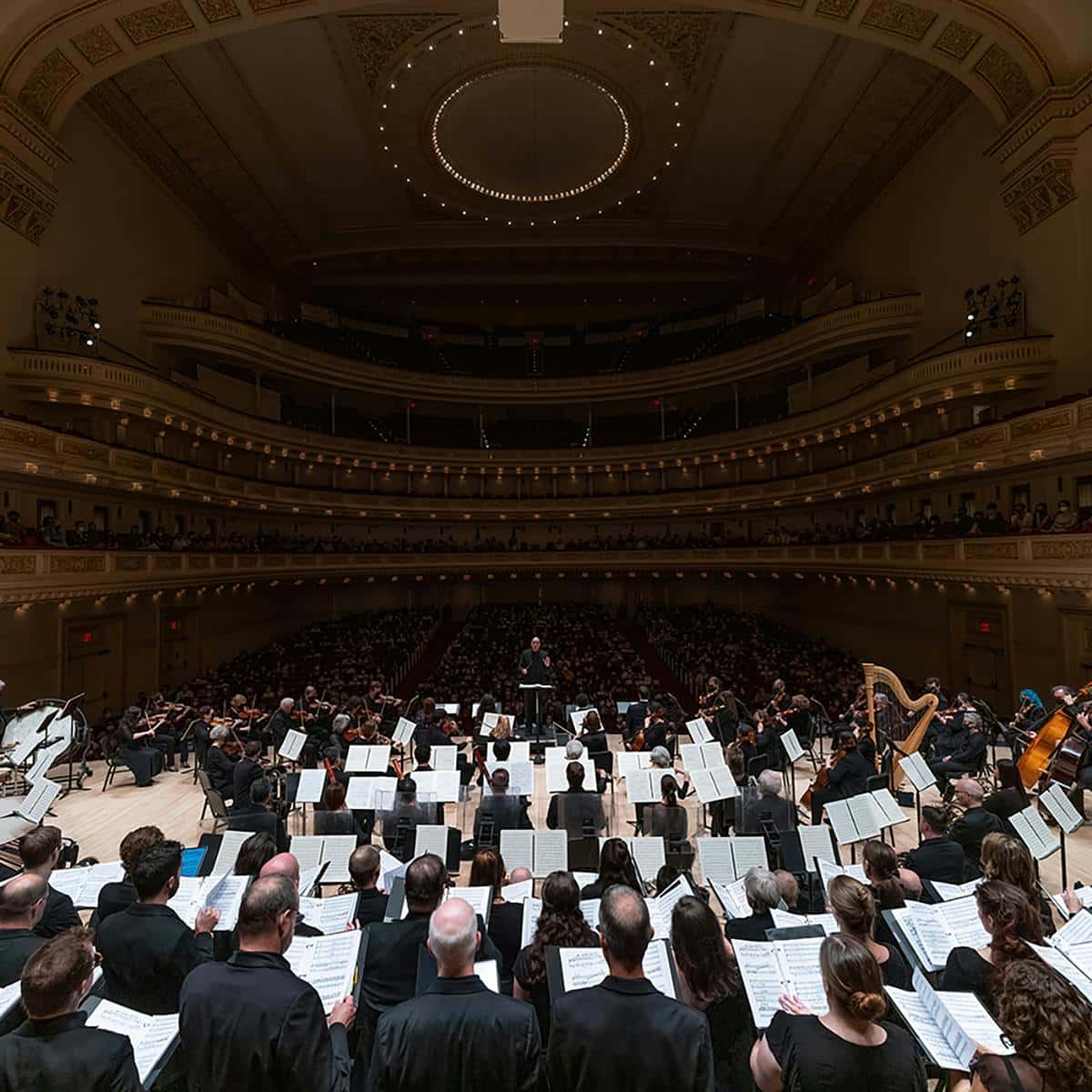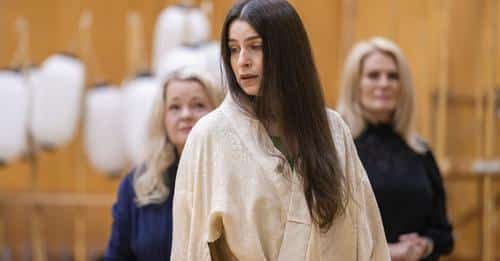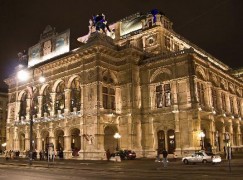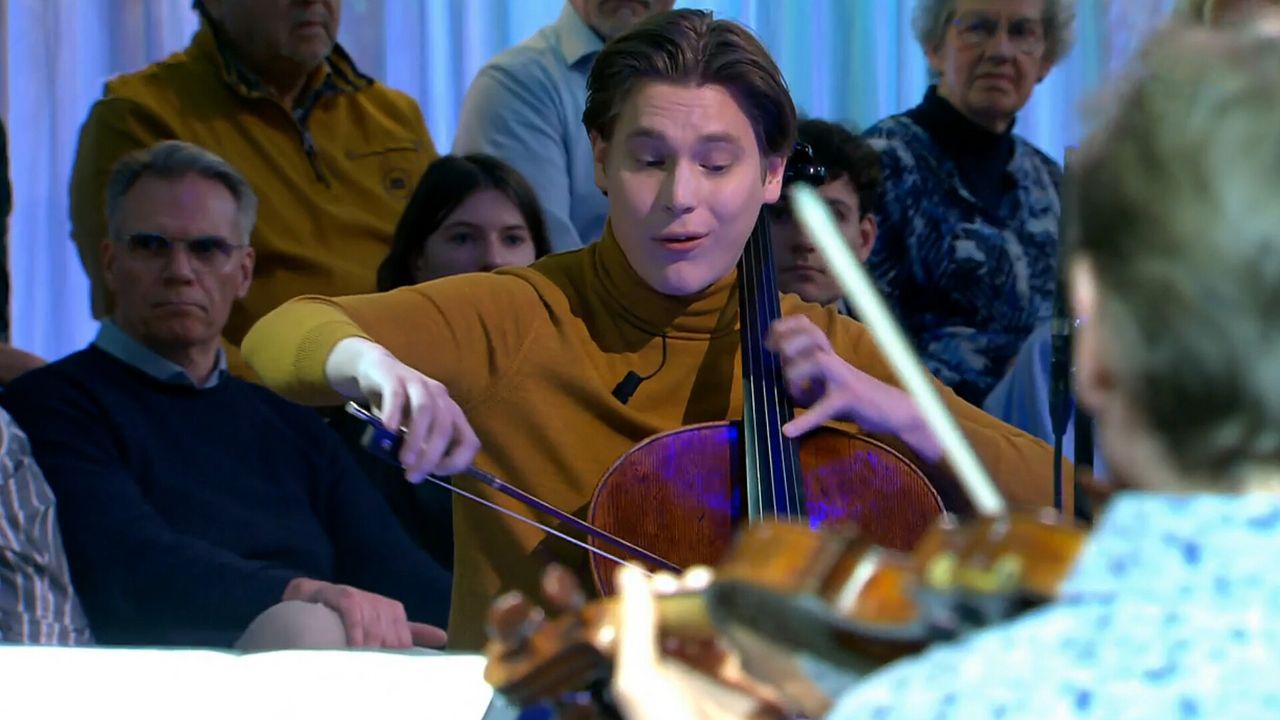First review: Gurrelieder at Carnegie Hall
OrchestrasThe parish paper has not yet covered Schoenberg’s Gurrelieder at Carnegie Hall. Happily, Susan Hall was there for slippedisc.com:
Gurrelieder, a work that overflows the stage in any large concert hall, was performed by the American Symphony Orchestra conducted by Leon Botstein. This is the ASO’s 60th anniversary. Its founder, Leopold Stokowski, premiered Gurrelieder in America in 1932.
Botstein takes the contentious view that Arnold Schoenberg, the work’s composer, was a megalomaniac who thought he could always best his fellow composers with a composition that was bigger, noisier, quieter and more complex than theirs (there is little further evidence of this). The mega-cantata, lasting more than two hours, requires 11 horns, four harps, eight flutes, a standard symphony orchestra doubled. Add choruses and six vocal soloists. It is a miracle that a rich glow emanates from the heart of the saturated strings.
Composing Gurrelieder, Schoenberg creates some of his most beautiful songs. The work was cheered wildly at its 1913 Vienna premiere. Yet the composer resented the applause almost as much as the hostility attracted by his modernism.
The opening is set too low for most tenors and with too loud an orchestra. Dominic Armstrong singing King Waldemar warmed up through the work, displaying a strong helden edge. Soprano Felicia Moore brought huge, colorful tones to the King’s beloved Tove. Mezzo Krysty Swann sang the Wood Dove’s song which concludes Part I. Alan Held boomed out his bass baritone as the Peasant. The court jester (Brenton Ryan) arrived, dashing through the parquet and jumping onto the stage. The chorus gave a magnificent dawn performance.
This work bridges the romantic and the modern, a midpoint between Richard Wagner’s Tristan und Isolde and Alban Berg’s Wozzeck.. In a letter to Ferruccio Busoni, Schoenberg wrote: ‘For a human being it is impossible to feel one sensation. One has thousands at once…This variegation, the multifariousness, this illogicity…I would like to have in my music.’
We hear it in Gurrelieder where characters react to the world about them and to their own feelings. The orchestra is a pool from which instrumental solos and ensemble phrases arise. Schoenberg felt that audiences could not give themselves up to his music. Botstein makes it hard to resist. The American Symphony Orchestra swept us up in Schoenberg.
Susan Hall






You did not have to be at the concert to write this. The BRSO and Rattle were initially scheduled to perform this at Carnegie in May but it did not appear in subsequent Carnegie schedules.
I’ve read your comment four times, and I still don’t understand what your point is. That said, the review is more a description of the work than a critique of the performance.
The greatest concert I’ve ever attended was a performance of Gurrelieder by Rattle and Philadelphia at Carnegie Hall in 2000. It also featured the loudest audience reaction I’ve ever heard after it was over.
Thanks Barry. I was there too. Traveled from DC. Marvelous performance
I was there too. Extraordinary. The sort of thing Rattle is really good at.
I too was there. Probably the best conducting I’ve ever seen from Rattle, too. Chorus a bit small, but still a glorious experience.
“The American Symphony Orchestra swept us up in Schoenberg.” Hmm – you wouldn’t know this from reading the review. Rubbish.
Quite a challenging work for a free-lance orchestra to play. Hope the concert went well!
Well, this wasn’t much of a review. There are other reviews out there on the evening that are far more engaging and revealing. I was there as well…it was a great night with a surprisingly near capacity crowd (I didn’t expect that we would see it). I don’t believe the work has been done in NYC for over 20 years (The Metropolitan Opera Orchestra did it under Levine back around 2000). It is always shocking to witness (and hear) all of those musicians onstage at the same time. They were crammed into every crevice of the large Carnegie Hall stage. Impressive. The audience was greatly appreciative of the concert…standing ovation on all levels of the house. Great job!
I think Susan is one of those computer generated things.
Agreed. One declarative sentence after the next. Another mind-numbing piece from this “reviewer.”
I honestly think a computer could do better. This woman has absolutely no clue how to write
Botstein is a brilliant and energetic polymath who has enriched the New York music scene with many revivals of greater and lesser forgotten works from the 19th and 20th centuries. However, his interpretations really wouldn’t be considered “anthology” and rarely get reviewed by the Gray Lady, especially in a week with so many high profile obituaries competing for space.
“Composing Gurrelieder, Schoenberg creates some of his most beautiful songs.” Why do people, critics included, now use “song” instead of “aria” in their reports? (And does Gurrelieder really have anything that resembles an aria?) And I thought the work included a somewhat important role for a Narrator. I guess I was wrong.
Maybe the “song” referred by the reviewer is the “Lied der Waldtaube” for soprano and orschestra, a part of “Gurrelieder” that is played more often than the whole work in a version for small ensemble (orchestrated by Schoenberg himself).
They absolutely *are* ‘songs’ (lieder) and not arias. An aria stems from the Italian operatic tradition of recitative and aria. Gurrelieder is from the German song tradition stretching back to Schubert and beyond. The work began life as a song cycle and it can still be clearly heard in this way, despite the vastly elaborated orchestral element. The review leaves much to be desired in many respects, but calling the work ‘songs’ is entirely correct.
Schoenberg used the German word, “Lied”, which translates to the English “song” rather than “aria”.
Still, a Lied is a lot more than just a ‘song’, which is Apple’s default description of any music track. For me, ‘song’, evokes Roger Quilter, Frank Bridge et al. ‘Lied’ implies an entirely different musical and cultural landscape.
They are songs. Not arias. Give it a listen. The first half is basically a song cycle with orchestra.
The piece is so uneven that I’m continually surprised it gets performed at all. Whatever happens in the work, Zemlinsky did far, far better, with smaller forces and in much less time. Then I note that it is the most tremendous wallow in existence for the conductor and all is made plain, for that makes it irresistible.
Listen to Stokowski in 1932 in the first orchestral interlude. Now this is a wallow…………nobody comes close to the “old magician” – and that string sound! OMG.
https://www.youtube.com/watch?v=A400vYcBQh8
René Liebowitz isn’t bad, either.
It’s a zero-sum game; one can (and should) love both Gurrelieder and Zemlinsky.
NOT a zero-sum, I meant to say.
The strange thing about Gurrelieder is that one would expect so much more from such an overgenerous number of participants. Surely the same results can be had by using normal forces.
I think the prelude is the most beautiful thing Schoenberg ever invented. He never again reached that level. It was long before Mathilde ran away with the painter…..
There are marvellous things in the work, but also ‘dead passages’, it is an uneven piece. Nothing wrong with that… Schoenberg could have developed this style further instead of sinking into 12-tone misery (for music, for audiences and players, for himself, for history). Ironically he decided that this work was in an outdated style, to be overcome (lots of Nietzsche there), but together with the other early works Gurrelieder has become part of the repertoire in spite of its unnecessary and therefore very expensive constitution.
For anybody interested in the figure of Schoenberg and what he meant, do read Harvey Sach’s brilliant book:
https://wwnorton.com/books/9781631497575
… which would also explain why Schoenberg’s later works will never be part of the repertoire.
Absolutely correct and particularly so about the Prelude and the later works. Performances of the latter are always the result of the enthusiasm of conductors rather than the audiences. They do look great on paper.
So pleased to see someone has said what you say about the Prelude. Can’t agree more. Remarkably beautiful.
That Interlude shows the 19C confusion of ‘great’ with ‘big’….
At the time of writing, Schoenberg was an admirer of R Strauss, so he had to outdo him.
In Schoenberg’s early Gurrelieder days, Strauss helped Schoenberg with getting some grants, but when Strauss heard or read Schoenberg’s later atonal works (must have been the Five Orchestral Pieces), he told Alma Mahler that Schoenberg lost his way and was now merely good enough for snow shivelling. Alma, always eager to play a role in music history, did not let pass the opportunity to fuel controversy, and immediately forwarded Strauss’ utterance to Schoenberg who immediately changed his opinion of Strauss’ music. As he wrote later: ‘What I did pick-up from his music I had, fortunately, misunderstood’.
Schoneberg´s later pieces ARE part of the repertoire…I don´t want to destroy your gaga paralell universe, but just check the internet…Neither your early or later “works” will ever be part of the rep,though….
I sang this with Levine years ago. Huge piece and a lot of fun. MTT was impressed that we did it off book.
Nice plug.
I was there and would have liked to see more space given to the superlative singers than the 70 words out of Susan’s 360-word tome which could have been AI-generated for all I know. This is what’s wrong with opera and vocal criticism today — few critics today understand the voices or the mechanics and physiology of singing.
BTW- How’s Susan’s new fantasy romance novel coming along?
I was recently at a performance of Gurrelieder in the Sydney Opera House Concert Hall, with the Sydney Symphony conducted by Simone Young; the first performance in Sydney and the fourth in Australia. It was a stunning evening of marvellous music, with just about every seat in the hall occupied. The audience erupted with joy after the final notes. I’m astonished that this was the first time I’ve ever had the chance to hear this fabulous piece.
Me too, and although I enjoyed it, I wouldn’t seek the piece out in future. Felt more like I was ticking the box a bit! And then the next afternoon I played violin in a performance of Mahler 2. Quite a weekend.
I’m not sure about Botstein’s megalomaniac theory about Schonberg, but it does take some cheek to have a monster piece like this and have an immense chorus assembled to wait through all two hours of the piece to sing only in the last four minutes or so of the piece.
I sang Gurrelieder back in Milwaukee in the 1970s and I’d have to say those four minutes of music don’t make easy singing either. But the effect — at least from where I stood — was cataclysmic.
Sort of like Mahler did to the chorus in the Resurrection Symphony?
Here is the final chorus:
https://www.youtube.com/watch?v=LFIwE0c-BOA
And here is his later music:
https://www.youtube.com/watch?v=L2Iuj-t_ZHs
Both are wonderful!
A truly thrilling Gurrelieder for me involved the LA Philharmonic in the 1980s. Gerard Schwartz subbed for the scheduled conductor — could it have been Previn?
Jessye Norman sang Tove and Hans Hotter sang/spoke Klaus. Both were stunning in their roles.
I think I heard Hotter as the speaker in Gurrelieder in London (Royal Festival Hall) in the 1980’s. I was familiar with his name, but hadn’t then realised what a legendary singer he was!
I think he subbed for Rattle
I know Gurreleider was composed before Schoenberg did his 12 tone thingy, but seeing, “Schoenberg composed”, and, ” beautiful songs”, together in the same sentence makes me feel I’ve wondered into some alternate dimension where nothing is real.
He was there, but left it.
https://www.youtube.com/watch?v=imhEEGmHHxc
The last half-hour is simply otherworldly — a series of glorious moments following one another. https://youtu.be/xPXuHs3Ksow?t=5230
Yes, but they should have removed that terrible man, screaming right through the music, from the hall.